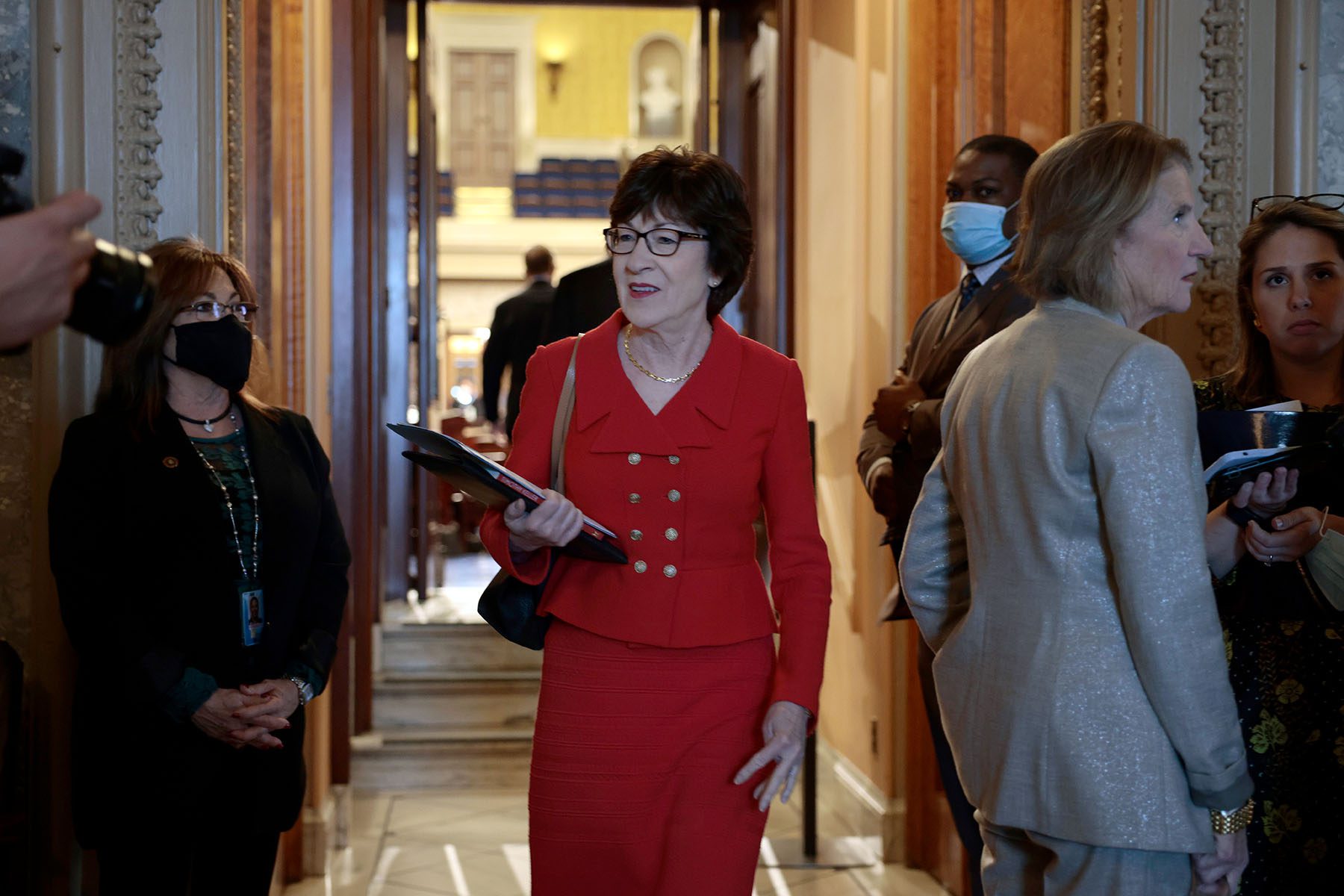Bipartisan talks in the Senate over how to proceed on voting legislation began in earnest Wednesday with a call convened by Republican Sen. Susan Collins of Maine that was a “wide-ranging discussion” about how to best protect voters, two people familiar with the meeting told The 19th.
Other participating senators were Republicans Roger Wicker of Mississippi, Thom Tillis of North Carolina and Mitt Romney of Utah, and Democrats Joe Manchin of West Virginia, Jeanne Shaheen of New Hampshire and Kyrsten Sinema of Arizona, four sources confirmed.
The call occurred just hours after Senate Majority Leader Chuck Schumer told Politico that he had “very little hope” for a bipartisan deal on voting after months of delays. Republican Minority Leader Sen. Mitch McConnell of Kentucky told the Washington publication that it was “worth discussing” changes to the Electoral Count Act, or ECA, a 1887 law that enables congressional lawmakers to contest the results of elections. The senators’ meeting also occurred on the eve of the first anniversary of the January 2021 attack on the U.S. Capitol, when some Republican lawmakers attempted to stop the certification of Democrat Joe Biden’s valid electoral victory and supporters of outgoing President Donald Trump stormed the building.
Amending the ECA, which is mostly related to how Congress certifies elections and not state-level policies governing election procedures, would be a narrower effort than two sweeping Democratic voting bills before Congress. Voting rights advocates said McConnell’s statements on the ECA were meant to be a distraction from discussion of the broader election-reform efforts and showed he knows Democrats are increasingly willing to pursue changing the Senate rules to pass voting legislation.
President Biden and Vice President Kamala Harris are both set to travel to Atlanta next week to deliver remarks on voting rights and the “urgent need to pass legislation to protect the constitutional right to vote and the integrity of our elections,” the White House said Wednesday. Dozens of Republican-controlled state legislatures introduced hundreds of restrictive voting bills last year. Some of the most stringent signed into law were in Georgia and Texas.
Modernizing the ECA was one of the topics discussed by the bipartisan group of senators Wednesday. There was a “strong determination” among the group that there must be action, one source said. They, like all who spoke to The 19th about the meeting, were not authorized to speak on behalf of the lawmakers present and did not provide additional details.
Any action on changes to the ECA, like other proposed voting legislation, needs 60 votes to move forward under current rules. Democrats have been weighing two proposals related to voting: the Freedom to Vote Act and the John R. Lewis Voting Rights Advancement Act, named for the Georgia representative and civil rights leader who died in 2020. Congressional Republicans, however, have said both pieces of legislation are overly broad, dooming their chances in the evenly split 100-seat Senate.
Facing that procedural hurdle, Democrats are discussing changing Senate rules to “carve out” voting rights from what’s known as the legislative filibuster and pass a bill by a simple-majority vote. But it is unclear whether they can change Senate rules because lawmakers within their own caucus, including Manchin and Sinema, have said they oppose it. Schumer has pledged to hold a vote on changing the rules for how election changes could pass by January 17, when the country commemorates Martin Luther King Jr. Day.
Democrats see passing voting-rights legislation as key to both protecting the electoral process from state-level efforts to limit voting and delivering on an issue important to the voters — particularly people of color — who put them in control of the White House and both chambers of Congress in 2020. The first anniversary this week of the January 2021 attack has given their effort momentum.
Democratic Sen. Amy Klobuchar, whose rules panel is spearheading the effort to pass voting-rights legislation, told NPR on Wednesday that “carrying on the fight for democracy by passing legislation — that should be the legacy of that day.”







